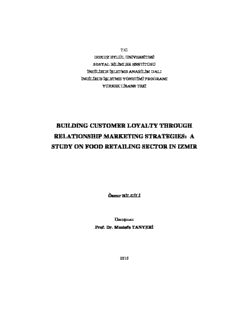
building customer loyalty through relationship marketing strategies PDF
Preview building customer loyalty through relationship marketing strategies
T.C. DOKUZ EYLÜL ÜNİVERSİTESİ SOSYAL BİLİMLER ENSTİTÜSÜ İNGİLİZCE İŞLETME ANABİLİM DALI İNGİLİZCE İŞLETME YÖNETİMİ PROGRAMI YÜKSEK LİSANS TEZİ BUILDING CUSTOMER LOYALTY THROUGH RELATIONSHIP MARKETING STRATEGIES: A STUDY ON FOOD RETAILING SECTOR IN IZMIR Öznur BİLGİLİ Danışman Prof. Dr. Mustafa TANYERİ 2010 ii YEMIN METNI Yüksek Lisans Tezi olarak sunduğum “Building Customer Loyalty Through Relationship Marketing Strategies: A Study on Food Retailing Sector in Izmir” adlı çalışmanın, tarafımdan, bilimsel ahlak ve geleneklere aykırı düşecek bir yardıma başvurmaksızın yazıldığını ve yararlandığım eserlerin kaynakçada gösterilenlerden oluştuğunu, bunlara atıf yapılarak yararlanılmış olduğunu belirtir ve bunu onurumla doğrularım. Tarih ..../..../....... Öznur BİLGİLİ iii ÖZET Yüksek Lisans Tezi İlişki Pazarlama Stratejileri ile Müşteri Sadakati Oluşturma: İzmir’ de Gıda Perakende Sektöründe Bir Çalışma Öznur BİLGİLİ Dokuz Eylül Üniversitesi Sosyal Bilimler Enstitüsü İngilizce İşletme Anabilim Dalı Tezli Yüksek Lisans Programı Bilgi ve bilginin kullanımıyla biçimlenen günümüzde, artan rekabet ile birlikte işletmeler mevcut müşterilerinin sadakat ve bağlılığını arttırma çabasına girmişlerdir. Hızlı değişimlerin yaşandığı bu dinamik ortamda işletmeler müşteriyi işletmenin odak noktasına yerleştirmenin ötesine geçip müşteriyle uzun dönemli ilişkiler kurarak müşteri sadakatini hedefleyen ilişki pazarlaması anlayışına yönelmişlerdir. Rekabetin her geçen gün yoğunlaştığı perakendecilik sektöründe de tüketici ihtiyaç ve isteklerinin karşılanması ve tüketicilerin memnun edilmesi bütün işletmeler için çok önemlidir. Bu çalışma ile gıda perakende sektörü müşterileri üzerinde ilişki pazarlama stratejilerinin müşteri sadakati oluşturmasındaki etkileri araştırılmıştır. Araştırmada ilişki pazarlaması uygulamaları, demografik faktörler ve müşteri sadakati arasındaki ilişkiler açığa çıkarılmıştır. Anahtar Kelimeler: Müşteri Sadakati, İlişki Pazarlaması, Perakendecilik, Sadakat Programları. iv ABSTRACT Master Thesis Building Customer Loyalty Through Relationship Marketing Strategies: A Study on Food Retailing Sector in Izmir Öznur BİLGİLİ Dokuz Eylül University Institute of Social Sciences Department Business Administration Master Program (with Thesis) At our present day, which is shaped by knowledge and usage of it, with the increasing competition companies have gone into an effort to increase the loyalty and commitment of their current customers. In a dynamic environment where rapid changes occur, companies tend to the concept of relationship with customers going beyond putting them at the center of the business. It is very important for the companies to meet the needs and wants of the customers and satisfying them in retailing sector where competition intense each day. With this work, the effects of relationship marketing strategies on building customer loyalty among food retailing customers have been investigated. This research reveals the relations between common relationship marketing activities, demographic factors and customer loyalty. Key Words: Customer Loyalty, Relationship Marketing, Retailing, Loyalty Programs. v BUILDING CUSTOMER LOYALTY THROUGH RELATIONSHIP MARKETING STRATEGIES: A STUDY ON FOOD RETAILING SECTOR IN IZMIR TEZ ONAY SAYFASI ii YEMİN METNİ iii ÖZET iv ABSTRACT v INDEX vi ABBREVATIONS x TABLES xi FIGURES xii APPENDIX LIST xiii INTRODUCTION 1 PART 1 BASIC ISSUES IN RELATIONSHIP MARKETING 1.1. KEY CONCEPTS IN RELATIONSHIP MARKETING 4 1.1.1. Relationship Building Blocks: Customer Value and Satisfaction 5 1.1.1.1. Customer Value 5 1.1.1.2. Customer Satisfaction 7 1.1.2. Retaining Customers 10 1.1.2.1. The Need for Customer Retention 10 1.1.2.2. Customer Lifetime Value 12 1.1.2.3. Customer Bonding 13 1.1.2.3.1. Adding Financial Benefits 14 1.1.2.3.2. Adding Social Benefits 15 1.1.2.3.3. Adding Structural Ties 16 1.1.2.4. Customer Profitability 16 1.1.3. Conceptualization of Customer Loyalty 17 vi 1.1.3.1. The Relationship Marketing Ladder of Customer Loyalty 19 1.1.3.2. Types of Customer Loyalty 20 1.1.3.3. Segmentation Based on Customer Loyalty 22 1.2. HISTORICAL DEVELOPMENT AND FOUNDATIONS OF RELATIONSHIP MARKETING 23 1.2.1. The Roots of Relationship Marketing 25 1.2.2. Limitations of the Traditional Marketing Paradigm 27 1.2.3. The Traditional Marketing Concept versus the Relationship Marketing Concept 28 1.2.4. Definitions of Relationship Marketing 33 1.2.5. The Forms of Relationship Marketing 36 1.2.6. Development of Relationship Marketing 38 1.3. THE UNDERPINNINGS OF RELATIONSHIP MARKETING 43 1.3.1. Trust 43 1.3.2. Commitment 44 1.3.3. Conflict Handling 44 1.3.4. Communication 45 1.4. THE GOALS OF RELATIONSHIP MARKETING 45 1.5. BENEFITS OF RELATIONSHIP MARKETING 48 1.5.1. Benefits of Relationship Marketing to the Business 50 1.5.2. Benefits of Relationship Marketing to the Customer 52 PART 2 SCOPE OF RELATIONSHIP MARKETING AND RETAILING 2.1. ADVANTAGES AND CHALLENGES ASSOCIATED WITH RELATIONSHIP MARKETING 54 2.2. RELATIONSHIP MARKETING AND CUSTOMER RELATIONSHIP MANAGEMENT 57 2.3. RELATIONSHIPS IN B-to-B MARKETS VERSUS B-to-C MARKETS 58 2.4. RELATIONSHIP MARKETING STRATEGIES 62 vii 2.4.1. Customer Attraction 64 2.4.2. Customer Loyalty Programs 65 2.4.3. Interaction 68 2.5. CONCEPTS OF RETAILING AND RETAILER 68 2.5.1. Nature and Importance of Retailing 69 2.5.2. Types of Retailers 71 2.5.2.1. Independent Retailers 73 2.5.2.2. Chains 73 2.5.2.3. Franchising 73 2.5.2.4. Leased Departments 74 2.5.2.5. Cooperatives 74 2.5.3. Trends in Retailing 74 2.5.4. Retailing Sector in the World and Turkey 78 2.5.5. The Retail Structure Change in Turkey 83 2.5.6. The Retail Structure Analyze of Izmir 85 2.6. RELATIONSHIP MARKETING AND RETAILING: SAMPLE APPLICATIONS 88 2.6.1. Relationship Marketing at IKEA 90 2.6.2. Relationship Marketing at TESCO 93 PART 3 AN APPLICATION ON SELECTED FOOD RETAILING SECTOR CUSTOMERS 3.1. CONCEPTUAL FRAMEWORK 96 3.1.1. Perceptions of Relationship Marketing Activities 96 3.1.2. Demographic factors 98 3.2. THE PURPOSE OF THE RESEARCH 100 3.2.1. Questionnaire Design 101 3.3. METHODOLOGY 103 3.4. STATISTICAL ANALYSIS AND FINDINGS OF THE RESEARCH 104 3.4.1. Reliability Analysis – Scale (Alpha) 104 viii 3.4.2. Normality Test for the Data Set 104 3.4.3. Demographic Characteristics 105 3.4.4. Hypothesis Testing 108 3.5. LIMITATIONS OF THE RESEARCH AND FUTURE RESEARCH 113 3.6. RESULTS AND DISCUSSION 114 REVIEW AND CONCLUSION 117 REFERENCES 119 APPENDIX 126 ix ABBREVIATIONS AMA American Marketing Association B-to-B Business to business B-to-C Business to consumer CLV Customer Lifetime Value CRM Customer Relationship Management FP Frequency Program RM Relationship Marketing TM Traditional (Transactional) Marketing TQM Total Quality Management x
Description: